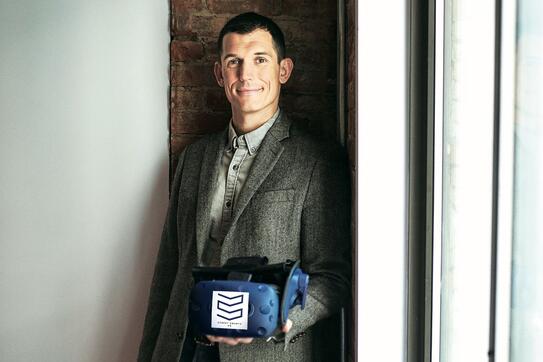Founders: Oliver Noteware '18 and Alice Formwalt
What's in the Box: VR goggles; laptop with six scenarios; guns that shoot virtual bullets
Awards: First Place, Columbia Venture Competition; Eugene M. Lang Entrepreneurial Initiative Fund
Having served in the US Marines for almost five years, Oliver Noteware ’18 believes that good training can mean the difference between life and death. After several police-involved shootings made news, Noteware wanted to use his military expertise and business education to prevent future such shootings. The result is Street Smarts VR, a virtual reality training system that allows officers to practice reacting to dangerous scenarios. Putting on the virtual reality glasses, a user enters a new world — a bar where patrons are fighting, for instance, or a house where a man with schizophrenia is in distress. Among the agencies using the Street Smarts VR system are the New York Police Department and the US Air Force’s Security Forces. Here, in his own words, Oliver Noteware talks about Street Smarts VR.
Watch some of the VR scenarios.
A Better Outcome
I went to Princeton and studied economics and Arabic, then worked in private wealth management in Beirut for two years. I was commissioned in the Marine Corps because I wanted to take everything I had learned and do something good. I ended up deploying to the Asia-Pacific region twice, with missions along the Korean DMZ and in support of the Philippine military in their fight against Abu Sayyaf insurgents.
A Clear Choice
I chose Columbia Business School because it’s in New York and has a tight veterans’ network. Among the classes that taught me how to grow a startup was the Greenhouse Accelerator with Dave Lerner, adjunct associate professor and the University’s director of entrepreneurship. Winning space in the Columbia Startup Lab was a big help during our first year.
Impact Through Numbers
There are about a million uniformed police officers in the country across more than 18,000 police departments, and the majority of departments have fewer than 25 officers. They don’t have the budget for systems that need large training facilities. But once they have our system, they can pop on the headset during a break and practice.
An Immersive Experience
Our system is completely interactive. You can move around the room. You hold a real weapon. You have to build the muscle memory. You can’t just watch trainings on YouTube.
Speaking the Language
I can talk to the customer because I know the lingo and have familiarity with the weapons. I have the perspective not of ‘We’re here to fix you’ but of ‘I understand what you’re going through because I’ve been there.’”
